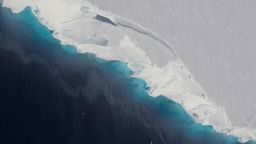Glaciers in East Antarctica could lose ice faster in the future than previously thought, scientists reported Friday, in an alarming feedback loop where glacier meltwater is triggering even more ice loss and sea level rise as the planet warms.
The findings come less than a week after scientists reported rapid melting of West Antarctica’s ice shelves may now be unavoidable, thanks to human-caused global warming. Together, these and other recent studies paint a dire picture of a melting southern continent that poses extreme risk of life-altering sea level rise around the world.
“This paper shows that it’s not only bad, but it’s even worse than we thought,” said Jamin Greenbaum, co-author of the study and assistant research geophysicist at the University of California San Diego’s Scripps Institution of Oceanography.
The study, published Friday in the journal Science Advances, focused on the Denman and Scott glaciers in East Antarctica that together hold enough ice to trigger roughly five feet of sea level rise.
Previous studies have shown that as glaciers melt, the water flows underneath them and out to sea – a process that enhances glacial melting and ice loss. Friday’s study factored that feedback into simulations to see how much it could accelerate Antarctic melting and sea level rise.
Scientists found the glaciers could retreat past a critical threshold about 25 years earlier than they would have without the meltwater discharge, if the world burns planet-warming fossil fuel at an accelerated rate.
Adding the meltwater feedback increased the sea level rise from the Denman and Scott glaciers by nearly 16% by the end of 2300 under this scenario of high levels of planet-heating pollution.
Importantly, Greenbaum said, the extra ice loss from meltwater discharge is currently excluded from climate models projecting sea level rise, despite the fact that it could be a major driver of ice loss across the whole continent. Measuring this phenomenon and accounting for it in climate models is necessary “to get a realistic picture of global sea level rise,” Greenbaum said.






